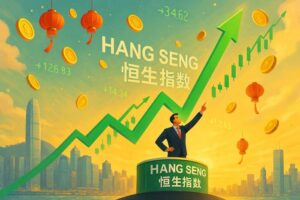Analyzing the Week in Asian Markets: Hang Seng Index and Beyond
As we navigate through a complex financial landscape, the latest movements in Asian equities offer a reflective lens on broader economic sentiments. At Extreme Investor Network, we strive not only to inform but to provide actionable insights to help you make the most informed decisions.
Hang Seng Index: A Steady Climb Amidst Global Caution
The Hang Seng Index experienced a notable 1.10% increase in the week ending May 23, marking its sixth consecutive weekly gain. This positive trend is a testament to the resilience of certain sectors, particularly amid ongoing concerns about debt and central bank policies worldwide. However, a pervasive risk-off sentiment in global markets has tempered these gains, reminding us that volatility remains a constant factor.
Automakers stood out in this week’s performance. BYD Company Ltd. (01211) surged by 7.14%, highlighting confidence in the electric vehicle sector, while Geely Automobile Holdings Ltd. (00175) also rose by 2.84%. Yet, tech stocks struggled under the weight of disappointing earnings, with Alibaba (09988) experiencing a 3.73% drop following less-than-expected 4QFY25 results. This dichotomy between sectors showcases the importance of sector-specific analysis in your investment strategy.
In contrast, mainland China’s equity markets faced challenges, with the CSI 300 slipping 0.18% and the Shanghai Composite Index declining by 0.57%. These results mirror growing concerns regarding the economic outlook, underscoring the necessity for strategic foresight.
For an in-depth breakdown of the Hang Seng Index and what it means for your portfolio, make sure to explore our additional resources.
Commodities: Safe Havens on the Rise
In response to the fluctuating risk environment, commodities displayed some notable trends:
-
Gold surged by 4.84%, closing at $3,356.66 as market uncertainties fueled interest in safe-haven assets. Investors should consider the implications of gold’s upward trajectory on their diversification strategies.
-
WTI Crude Oil saw a slight decline of 0.53%, settling at $61.375, driven primarily by oversupply concerns. This fluctuation calls for cautious evaluation if you’re invested in energy stocks.
- Iron Ore experienced a 1.44% drop, under pressure from weak economic indicators emerging from China. As the demand outlook dims, potential investors must weigh these factors when considering commodities in their portfolios.
ASX 200: A Mixed Bag But Optimistic
The ASX 200 reported a modest 0.21% gain this week, even amid the end of an eight-day winning streak. Technology and gold stocks led this upswing:
-
The S&P/ASX All Technology Index increased by 1%, largely buoyed by a dovish rate cut from the Reserve Bank of Australia (RBA).
-
Northern Star Resources notably surged by 9.82% in response to rising gold prices, illustrating the potential for significant returns in resource sectors.
- The financial sector also saw healthy gains, with Commonwealth Bank of Australia rising by 2.46% and National Australia Bank by 1.86%. These developments suggest a robust landscape for banking stocks, especially in a low-interest-rate environment.
Nikkei 225: Battling Inflation Headwinds
Conversely, the Nikkei 225 Index declined by 1.1%, influenced heavily by rising inflation and a stronger Yen. Japan’s underlying inflation accelerated from 3.2% in March to 3.5% in April, triggering speculation around a potential interest rate hike by the Bank of Japan in Q3 2025.
Such fluctuations underscore the need for vigilance among investors, especially with major players like Nissan Motor Corp. (7201), Softbank Group (9984), and Tokyo Electron (8035) all experiencing declines this week.
Outlook: Key Data and Trade Talks in Sight
As we look ahead, the upcoming week is poised to be pivotal for markets worldwide. Key trade talks, particularly relating to proposed EU tariffs, will likely shape global sentiment. Major economic data releases from the US, Australia, and Japan will provide further clues on market direction:
-
Australia’s CPI and retail sales will impact RBA policy expectations, affecting your strategies related to Aussie stocks.
-
Japanese labor and retail figures may influence Yen direction and Nikkei performance.
- Meanwhile, US GDP, inflation, and consumer confidence data will dictate the Federal Reserve’s next moves and further influence the Hang Seng and broader Asian markets.
At Extreme Investor Network, we encourage our readers to remain proactive and responsive to these developments. Staying updated on trade relations, central bank actions, and key economic indicators is essential for navigating the future landscape of investments.
For deeper insights into the Hang Seng Index and how to harness these trends for your investment portfolio, dive into our expert analyses and resources today!

